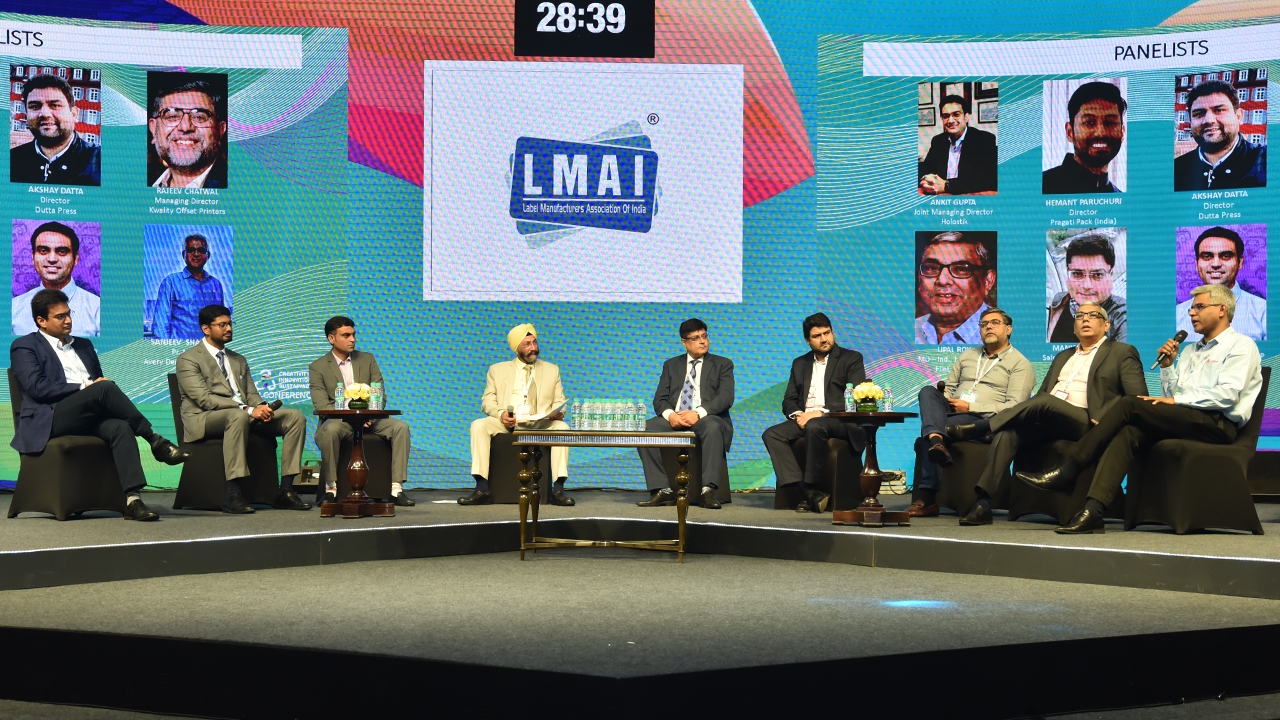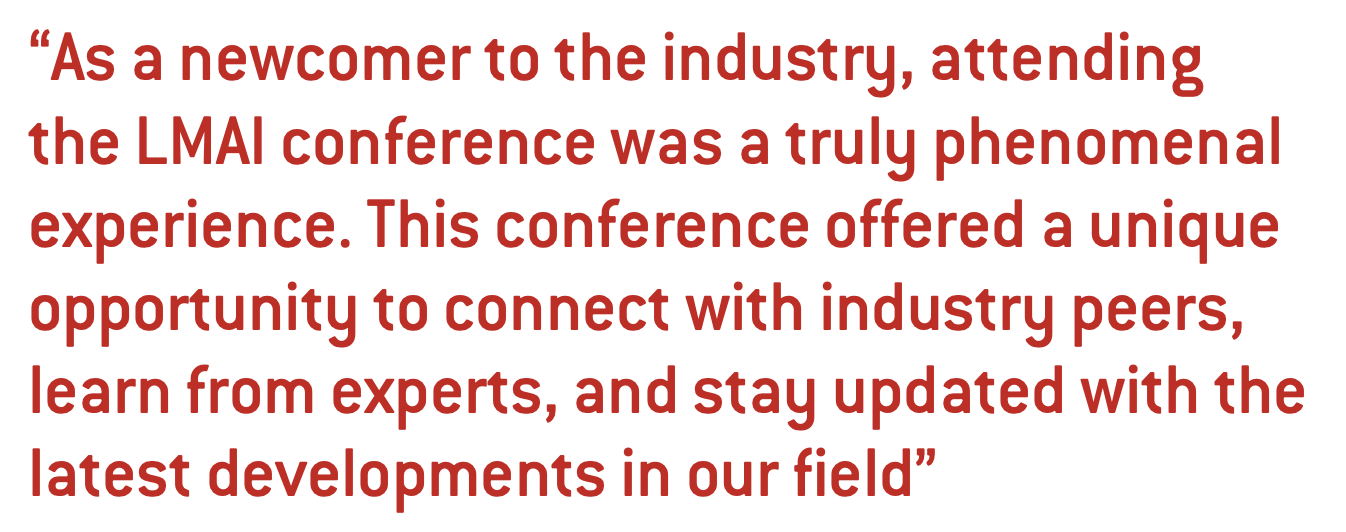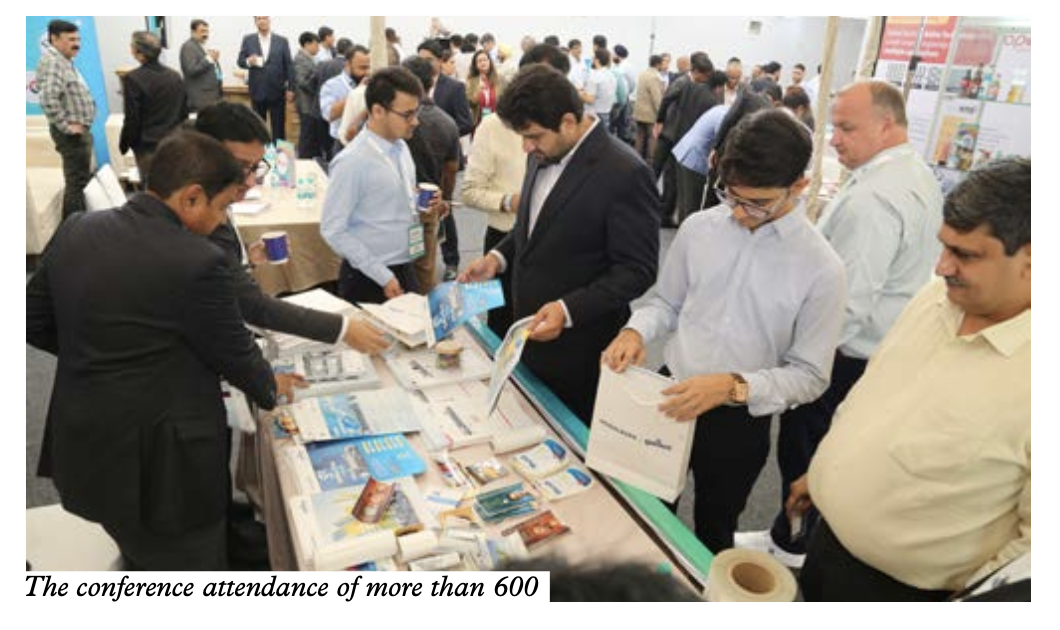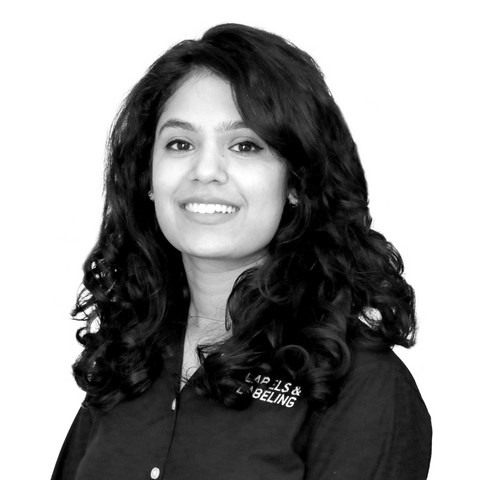LMAI conference 2023 explores key industry trends
Returning for the first time since Covid, the LMAI conference brought the Indian label industry under one roof once again.

LMAI panel discussion highlighted the many ways the industry is innovating for a sustainable future.
LMAI hosted a two‐day conference at the Leela Palace hotel in Jaipur, Rajasthan. The conference was packed with informative presentations, thought‐provoking panel discussions and networking opportunities. The conference with the theme ‘Creativity, innovation, sustainability’ had more than 600 attendees.
While opportunities for growth in the Indian industry are many, it is not without its challenges. Converters face challenges such as a lack of trained staff, increasing supply chain costs, material shortages, plastics tax and the rising cost of raw materials.
The conference brought forward the key trends in the industry including diversification into new market segments, automation and run lengths getting shorter. It also highlighted issues such as supply chain and logistics. Sustainability has become synonymous with packaging as the industry focuses on reducing the environmental impact of packaging and labels.
Flint Group shared that the company has introduced fully compliant food‐safe UV flexo inks in recent years. Its next major launch will be FCM (food compliant) dual cure inks, which can be cured on both arc UV and LED‐UV systems. This will be followed by an FCM dual cure inert technology platform in 2025.
The company also discussed how its new deinking primer technology enhances the recycling of PET containers because the ink no longer contaminates the recovered PET. The system is now being trialed by converters and brands in Europe. Flint has also developed a caustic‐resistant varnish that ensures inks stay with the label in cases where the label material is different from the bottle material and is separated by flotation.

Jindal SMI is developing thinner and lighter labelstocks. The company has introduced a conformable PP that reduces material usage by up to 40 percent compared to standard 85 micron PE film. Another new product is PCR white opaque cavitated BOPP film with similar properties to conventional PP. It contains 30 percent post‐consumer recycled content.
Jindal SMI also announced a release paper recycling program and a new wash‐off label adhesive that enables the removal of labels at lower water temperatures.
The continued growth of digital printing in India and globally was widely discussed. Konica Minolta stated that in 2022, 45 percent of worldwide narrow web label press installations were digital. HP India shared changes in consumer buying habits and more startups emerging has paved the way for a dramatic growth of digital printing.
Waste reduction
Reducing waste by making the best use of resources was also a popular topic of discussion during the conference. Bobst spoke about its OneECG extended color gamut Inline flexo process, which uses up to seven colors to achieve 88 percent of the Pantone Digital Library while ensuring consistency and repeatability.
In the pressroom, Miraclon explained how choosing the right plates can simplify the flexo process. The company has recently launched its UV Choice printing technology with a new plate surface patterning technology specifically tailored to label and other UV flexo printed narrow web applications.
Vinsak highlighted that sustainability should be observed not just during the printing process but throughout the supply chain, including manufacturing equipment from sustainable resources, implementing reusable packaging designs, better inventory management and automation for better utilization of resources.
Kurz India highlighted that its digital metal 3D Uniliner will be available in India soon. The company also spoke about its Recosys carrier recycling program that is already implemented in Europe. Kurz has also reduced carrier thickness from 12 to 10 microns.

Mark Andy pointed out that current market challenges such as lack of staff, supply chain cost and issues, material shortage, plastic tax, rising cost, shorter run length and multiple SKUs can be tackled using data collection and analysis and automating production processes. Implementing controlled changes after monitoring and analyzing the activities of a press in real‐time will lead to better production performance.
Hybrid technology
Hybrid printing is another fast‐growing trend, with manufacturers including Gallus and Domino promoting these technologies at the conference. The Gallus One press offers digital print capabilities with finishing options such as a die‐cut unit, flexo unit, cold foiling and UV ink printing. Domino’s digital retrofit unit can be integrated with a flexo press.
At the same time, semi‐rotary technology offers its own unique benefits. Iwasaki highlighted the IF330 semi‐rotary flexo press and compared it to letterpress, full rotary flexo and digital press technology. Compared to letterpress, it is easier to operate, no inking adjustment is required and consequently, waste can be eliminated. The press can be used for proof printing for a rotary flexo press and can print multiple sizes of labels with one cylinder. The press also comes with inline finishing and embellishment capabilities.
The conference was attended by young newcomers to the industry. Aryaman Julka joined his father Jatinder Kumar Julka in his Alliance Printech business and attended the conference. He says: ‘As a newcomer to the industry, attending the LMAI conference was a truly phenomenal experience. While I’ve been to trade shows and exhibitions before, this conference offered a unique opportunity to connect with industry peers, learn from experts, and stay updated with the latest developments in our field. The insightful sessions and engaging discussions were a valuable learning experience for me.
‘Furthermore, the conference provided an excellent platform to build meaningful connections with like‐minded professionals, fostering a sense of camaraderie within the industry. Overall, the LMAI conference was a remarkable journey of learning, networking and personal growth. I’m grateful for the opportunity and look forward to more such enriching experiences.’
LMAI panel discussion
LMAI conference also hosted a panel discussion with label converters, material and machine suppliers titled ‘Challenges in creating sustainable innovations in labels’. The panel was moderated by Harveer Sahni, chairman, Weldon Celloplast and included Ankit Gupta, joint managing director, Holostik; Hemant Paruchuri, director Pragati Pack (India); Devendra Solanki, director sales, Sicon Packs; Rajeev Chatwal, managing director, Kwality Offset Printers; Upal Roy, managing director, India / Middle East / Africa, Flint Group; Manish Kapoor, sales manager ‐ Indian Sub Continent, Nilpeter; Umesh Kagade, segment manager, labels and packaging, HP; Sanjeev Sharma, director product management, Avery Dennison South Asia; and Akshay Datta, director of Dutta press.
The discussion started with measures the industry is taking to foster innovation in sustainability. Pragati Pack’s Paruchuri says that while aesthetics in labels are crucial, sustainability cannot be ignored. One result is the Indian industry is seeing a reduction in plastics use by brands. The converter is also working on anti‐counterfeiting products.
Datta emphasizes that the focus should shift from only considering the end product to examining the materials used in its production. While wash‐off labels have been around for a while, they are gaining traction now and are likely to become standard.
Kagade adds that HP is committed to bringing sustainability throughout the production process, from machine manufacturing to the final print. He underlines the sustainability advantages of digital printing, with HP inks certified for recyclability and de‐inking processes.
Holostik’s Gupta emphasizes that the drive toward sustainability needs to start with brand owners. However, it’s important to acknowledge that sustainability often comes with added costs, and pricing is a significant concern. The converters and manufacturers within the ecosystem are collaborating to address these pricing challenges.
In turn, the younger generation is playing a pivotal role in shaping market trends. With 65 percent of India’s population being 35 years and younger, this demographic exerts pressure on brands to adopt sustainable practices. Kagade actively educates brand owners about sustainability. Additionally, the Indian government is also working to promote sustainable practices and has introduced CO2 emissions policies that incentivize brands to prioritize eco‐consciousness.
Discussing technological innovation, Chatwal from Kwality Offset Printers suggests that converters should invest in cutting‐edge technologies that include multiple processes including flexo and digital. Kwality has reduced its foil usage by using more metalized paper.
Sharma explains that release liner poses a challenge and is considered a ‘necessary evil’. The industry needs to collectively find ways to reuse and recycle liners. Avery Dennison has initiated programs such as the AD Circular Program to promote the reuse, recycling, and upcycling of liners. It has also developed paper liners that can later be converted into usable tissues.
Roy of Flint Group mentions that packaging is evolving to become more recyclable, with a focus on monolayer, paper and board, using compostable inks. Bio‐based raw materials for ink production are gaining popularity, all the while Flint ensures competitive pricing.
Kapoor and Kagade highlight that machine manufacturers such as Nilpeter and HP are actively developing energy‐efficient machines. Replacing UV curing with UV LED technology is a step toward energy savings.
Stay up to date
Subscribe to the free Label News newsletter and receive the latest content every week. We'll never share your email address.


